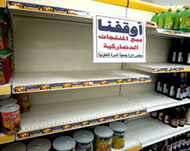US stands back from cartoon row
As Muslim outrage over 12 cartoons depicting Prophet Muhammad in the European press continues, a former US State Department official says the media should have exercised greater responsibility and accountability.

In Afghanistan, four protesters were killed when they clashed with police after a demonstration against the cartoons turned violent.
In Lebanon, one person was killed after the Danish embassy was set on fire in Beirut, a day after similar acts of vandalism and violence broke out in Damascus.
Edward Walker, a former US ambassador and current president of the Washington-based Middle East Institute, believes press responsibility should go hand-in-hand with maintaining and sustaining the freedom of the press.
“It’s true that the freedom of press gives you certain protections but it doesn’t protect you from incitement of violence,” Walker, who served as the US envoy to Israel, Egypt, and the United Arab Emirates, told Aljazeera.net.
European newspapers which published the images have cited two justifications. The first is that audiences need to see the pictures to understand the polemic point of view. The second is that since freedom of expression is under assault, running these particular cartoons is a matter of principle.
The cartoons have been published in Denmark, Norway, France, Ireland, Germany, Italy, Spain, Switzerland, Bulgaria, Hungary, and Poland.
Asked if he thought the cartoon controversy will harm the image of the West in the Muslim world, Walker said: “It will set back the image of the French and Danes. I think the response of the American people and the US administration has been very balanced and very correct.”
Targeting hate speech
In a press conference on Monday, Scott McClellan, the White House spokesperson, officially urged those criticising the caricatures “to speak out forcefully against all forms of hate speech, including cartoons and articles throughout parts of the Arab world which frequently espouse anti-Semitic and anti-Christian views”.
Walker supports the administration’s statement and says by stepping on another person’s religion, “you are creating the seeds of violence”.
|
“I wouldn’t want to see cartoons of Jesus Christ along the same lines. I think it’s a question of good taste” Edward Walker, |
“I wouldn’t want to see cartoons of Jesus Christ along the same lines. I think it’s a question of good taste,” he said.
“The president of the United States is a religious man and he understands that other religions have their sensitivities and we ought to respect those sensitivities.”
Ambassador David Newton, an expert on US-Arab relations and adjunct scholar at the Middle East Institute, believes this latest surge of outrage comes as the result of years of built up frustration against the West.
“There’s still this pervasive feeling that everybody is against them [Muslims], that the world is against them and that somehow they don’t count for anything. I think that’s what angers them the most.
“I think it’s one thing to be angry but you don’t have to go on a rampage of destruction.”
Late reaction
When the cartoons were first published on 30 September in the Jyllands-Posten, Denmark’s largest newspaper, there was hardly any public outcry. It took nearly three weeks before the ambassadors of 11 Muslim countries demanded that the Danish government intervene.
 |
|
Danish dairy products have |
Why did it take the Muslim world five months to react to the cartoons?
Fawaz Gerges, chair of Middle Eastern Studies and Arab Affairs at Sarah Lawrence College, says that some activists believe that the cartoon controversy is not an isolated incident but it is part of a systematic attack against Islam and Muslims.
“I believe in particular Egypt played a decisive factor in drawing the attention of large segments of Arab and Muslims into the cartoon controversy and forcing the hands of religious establishments and the ruling establishment to make the cartoons a prominent issue,” he said.
“In the eyes of many Westerners now, the violent protests we have seen now in some places reinforces misconceptions of Arabs and Muslims.”
Political calculations
The cartoon controversy is escalating at an alarming rate. The Bush administration called on Saudi Arabia to work with other Arab nations to calm the violence. In Tehran, hundreds of Iranians hurled stones and firebombs at the Danish embassy and pelted the Austrian embassy with rocks.
Walker believes that the Beirut and Damascus demonstrations were by no means spontaneous but more of a political calculation by the Syrian government.
“The Syrian regime has always a strong control over the crowd in Syria and from my experience as ambassador, if the crowd started attacking foreign embassies, then the Syrian government is fully responsible.”
Nevertheless, while castigating some Arab governments, Walker cautioned that distrust of immigrant communities in Europe may have also played a factor.
“There’s been some evidence of Islamophobia particularly after the attacks in Spain. It started to grow when it was clear that it was immigrants from northern Africa who were responsible,” he said.
A train bombing killed more than 200 people on 14 March 2004 in Madrid.